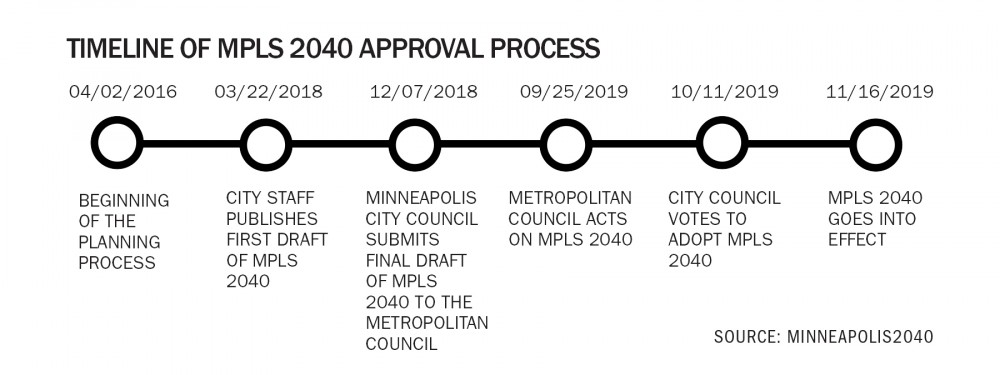As the city of Minneapolis gets closer to enacting its plan for future growth and development, some community members have mixed reactions to its proposed changes.
After the Minneapolis City Council approved the policy last December, the Minneapolis 2040 Comprehensive Plan will head to a vote by the Metropolitan Council next week. The plan features 14 goals including affordable housing, increased public transit, eliminating disparities and responses to climate change.
Though city officials engaged residents for years to craft the plan, some remain skeptical of how it could transform their neighborhoods.
Using input from residents and community members after more than 100 meetings between 2016 and 2018, city officials developed 100 policies ranging from increasing density through zoning changes to public transit accessibility.

Chris Lautenschlager, executive director of the Marcy-Holmes Neighborhood Association, said the association encouraged resident input during the planning process.
“We basically made sure that we had individuals represented in their own voice at these meetings,” Lautenschlager said. “Our concerns were centered around the ability to weigh in and have meaningful input that the city took seriously.”
Of the plan’s proposed changes, one of the first to be enacted would be an ordinance to allow multi-family housing units or triplexes in residential areas exclusively zoned for single-family homes. Ward 2 City Council Member Cam Gordon said many of these areas are largely home to white residents due to past exclusionary lending practices that kept minorities from accessing housing. The plan aims to undo that history by providing more access to affordable housing citywide, he said.
“The idea is that it will create opportunities for housing in different places,” Gordon said. “I’m hoping more people of color will take advantage of living in areas where their parents or grandparents wouldn’t have had that opportunity at all.”
Southeast Como, which has the lowest density of the four neighborhoods around the University, could see more multi-family housing where single-family homes currently sit. Southeast Como Improvement Association Board President Karl Smith said while developing affordable housing options can be beneficial, converting existing homes can have unintended consequences, like increased congestion.
“Having higher density housing, especially with good access to transit, is fine,” Smith said. “But jamming multiple bedrooms into what was once a duplex or single-family home … is problematic.”
The Metropolitan Council will vote on the city’s 2040 plan Sept. 25. The plan will then be voted on by the City Council Oct. 11 and officially go into effect Nov. 16.













